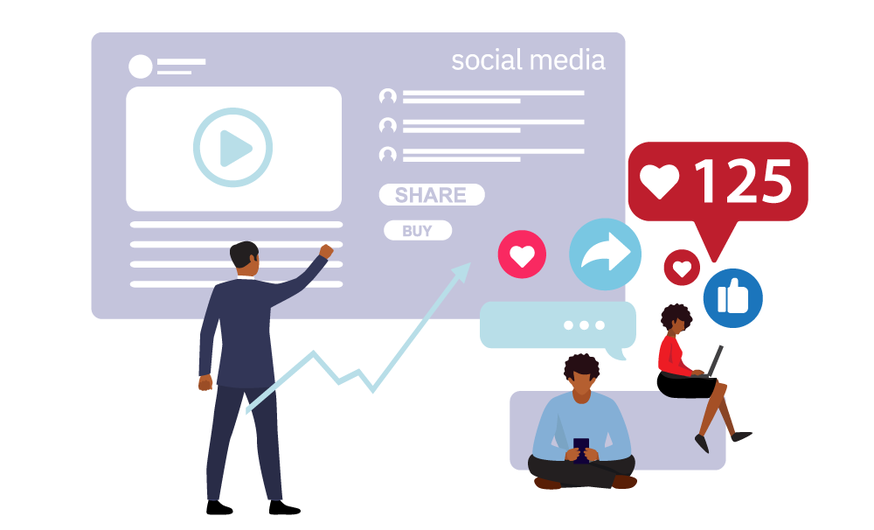In today’s digital age, businesses are constantly seeking ways to stay ahead of their competitors and better understand their target audience. One valuable strategy that has emerged is social listening. In this article, we will explore social listening meaning and delve into its significance in gaining valuable customer insights. So, let’s embark on this journey and discover how social listening can revolutionize your business!
Understanding The Social Listening Meaning

In the fast-paced world of social media, understanding what customers say about your brand and industry is crucial. Social listening meaning provides businesses with the opportunity to tap into this vast pool of customer conversations and extract valuable insights. By actively monitoring and analyzing these discussions, companies can gain a deep understanding of their audience, enabling them to make data-driven decisions and build stronger customer relationships.
What is Social Listening Meaning?
Social listening meaning refers to the practice of monitoring and analyzing online conversations and mentions of specific keywords, phrases, or brands across various social media platforms. It involves paying attention to not only direct mentions of a brand but also discussions related to industry trends, competitors, and customer pain points. This process allows businesses to gain comprehensive insights into customer sentiment, preferences, and needs.
The Process of Social Media Listening
The process of social listening involves several key steps:
- Setting Objectives: Define your goals and objectives for social listening, such as improving customer satisfaction or identifying emerging trends.
- Choosing Relevant Channels: Determine the social media platforms where your target audience is most active, such as Facebook, Twitter, Instagram, or LinkedIn.
- Identifying Keywords and Topics: Select keywords and topics that are relevant to your brand, products, or industry to track and analyze.
- Monitoring Mentions: Utilize social listening tools to monitor and collect data on mentions, conversations, and sentiments related to your chosen keywords and topics.
- Analyzing and Extracting Insights: Analyze the collected data to identify trends, patterns, and sentiments associated with your brand or industry. Extract valuable insights that can inform decision-making.
- Taking Action: Use the insights gained from social listening to inform marketing strategies, improve customer experience, and enhance overall business performance.
The Importance of Social Listening for Businesses
Enhancing Brand Reputation
Social listening allows businesses to proactively manage their brand reputation. By monitoring and addressing customer concerns, feedback, and complaints in real time, companies can promptly resolve issues, provide exceptional customer service, and cultivate a positive brand image.
Identifying Customer Needs and Preferences
Understanding customer needs and preferences is critical for delivering products and services that align with their expectations. Social listening enables businesses to identify emerging trends, uncover customer pain points, and gather feedback on existing offerings, thereby empowering them to make informed decisions and enhance customer satisfaction.
Improving Customer Experience
Social listening provides businesses with an avenue to gain insights into customer sentiment and feedback. By identifying common pain points or areas of improvement, companies can enhance their products, services, and overall customer experience, resulting in increased loyalty and advocacy.
Gaining Competitive Advantage
By monitoring conversations related to competitors, social listening enables businesses to gain a competitive advantage. It helps identify gaps in the market, benchmark against industry leaders, and discover untapped opportunities that can differentiate your brand from the competition.
Tools and Techniques for Effective Social Media Listening

To effectively engage in social media listening, businesses can leverage a variety of tools and techniques. Here are some popular ones:
- Social Media Monitoring Tools: These tools enable businesses to track and monitor mentions, hashtags, and conversations across multiple social media platforms.
- Keyword Tracking: By monitoring specific keywords and phrases, businesses can uncover relevant discussions and join the conversation at the right time.
- Sentiment Analysis: Utilizing sentiment analysis tools, companies can determine the overall sentiment associated with their brand or industry and gauge customer satisfaction levels.
Analyzing and Utilizing Social Listening Data
Social listening data is a goldmine of insights that can guide decision-making and shape business strategies. Here are a few key ways to analyze and utilize social listening data:
Sentiment Analysis
Sentiment analysis involves evaluating the emotional tone behind customer conversations. By understanding whether the sentiment is positive, negative, or neutral, businesses can gauge the overall perception of their brand and make necessary improvements.
Identifying Trends and Patterns
By analyzing social listening data, businesses can uncover emerging trends, recurring themes, and patterns within their industry. These insights can be used to stay ahead of the competition, identify new opportunities, and adapt marketing strategies accordingly.
Informing Marketing and Product Strategies
Social listening data provides valuable input for refining marketing and product strategies. By understanding customer needs, preferences, and pain points, businesses can tailor their messaging, develop new products or features, and create more impactful marketing campaigns.
Challenges and Best Practices

While social media listening offers immense potential, it also comes with its challenges. Here are some common challenges and best practices to overcome them:
Dealing with Information Overload
With the vast amount of data available through social listening, businesses must develop effective strategies to handle information overload. This includes utilizing advanced filtering techniques, focusing on key metrics, and prioritizing insights that align with their objectives.
Ensuring Data Accuracy and Reliability
To derive accurate insights from social media listening, it is essential to ensure data accuracy and reliability. This involves using reliable tools and techniques, verifying sources, and cross-referencing information to minimize the risk of misinformation.
Engaging in Meaningful Conversations
Social listening is not only about monitoring conversations but also actively engaging with customers. Responding to feedback, addressing concerns, and participating in relevant discussions help build trust, foster relationships, and demonstrate a customer-centric approach.
Staying Ethical and Respectful
Respecting user privacy and adhering to ethical guidelines are of utmost importance in social listening. Businesses should handle customer data responsibly, obtain necessary permissions, and ensure compliance with relevant data protection regulations.
Future Trends
As technology continues to evolve, so does the practice of social listening. The future of social listening holds exciting possibilities, including:
- Advanced AI-driven Insights: Artificial intelligence will play a significant role in analyzing social listening data, providing more accurate insights, and automating processes.
- Integration with Business Intelligence: Social listening will integrate with broader business intelligence systems, allowing for a holistic view of customer insights and seamless data-driven decision-making.
- Real-time Personalization: Social listening will enable businesses to deliver real-time personalized experiences, tailoring products, services, and marketing messages based on individual customer preferences and needs.
Case Studies
Case Study 1: Nike’s “React” Shoe Launch
Nike leveraged social listening to identify a growing demand for more comfortable, responsive running shoes. By analyzing customer conversations and feedback on social media, they discovered key pain points—runners wanted more cushioning and durability. In response, Nike designed the React shoe and crafted a marketing campaign targeting the exact concerns voiced by consumers. The result? A record-breaking 81% increase in engagement on social platforms and a 35% boost in sales within the first quarter of launch.
Case Study 2: Netflix’s Content Strategy
Netflix’s ability to produce hit shows isn’t just luck—it’s data-driven social listening. The company tracks trending conversations, memes, and audience reactions to identify content preferences. By tapping into online discussions, Netflix decided to produce “Stranger Things”, a show inspired by 80s nostalgia, which was already gaining traction online. The series became a global sensation, generating over 15 million social media mentions in its first month and securing multiple seasons due to its popularity.
Case Study 3: Wendy’s Twitter Roasts & Viral Marketing
Wendy’s transformed its brand image by actively engaging in social listening and adopting a witty, humorous tone on Twitter. By responding to customer tweets with clever comebacks, the brand skyrocketed in popularity. One of their most famous roasts—challenging McDonald’s on frozen beef—led to a 49% increase in engagement and millions of retweets. Wendy’s social listening strategy directly contributed to its highest quarterly revenue increase in years.
Influencer Quotes & Tweets
🔹 Gary Vaynerchuk (@garyvee):
“Your customers are talking about you on social media. The question is—are you listening?”🔹 Neil Patel (@neilpatel):
“Social listening is not just about monitoring; it’s about understanding your audience and delivering exactly what they need.”🔹 Rand Fishkin (@randfish):
“Ignoring social listening is like ignoring free market research. Brands that pay attention thrive; those that don’t, fade.”🔹 Elon Musk (@elonmusk):
“Twitter is basically a goldmine for understanding public sentiment. Companies should use it to improve, not just advertise.”
Conclusion
Social listening meaning is a powerful strategy that enables businesses to unlock valuable customer insights, enhance brand reputation, and stay ahead of the competition. By actively monitoring and analyzing online conversations, companies can make data-driven decisions, improve customer experiences, and cultivate stronger relationships. Embrace the potential of social listening, and let it be the catalyst for your business success!
Are you ready to take your business to the next level with the power of social listening? Request a demo from AIM Technologies today and discover how our cutting-edge social listening tools can revolutionize your customer insights and drive your business forward.
FAQs
Q1. How can social listening benefit my business?
- Social listening can benefit your business by providing valuable insights into customer sentiment, preferences, and needs. It enables you to enhance your brand reputation, identify emerging trends, improve customer experiences, and gain a competitive advantage.
Q2. Which social media platforms should I focus on for social listening?
- The choice of social media platforms depends on your target audience. Identify the platforms where your audience is most active and engage in relevant conversations. Popular platforms include Facebook, Twitter, Instagram, and LinkedIn.
Q3. How can sentiment analysis help in social listening?
- Sentiment analysis helps businesses understand the overall emotional tone behind customer conversations. It enables you to gauge customer satisfaction levels, identify areas of improvement, and make data-driven decisions to enhance your brand’s perception.
Q4. What are the best practices in social listening?
- Some best practices in social listening include dealing with information overload, ensuring data accuracy and reliability, engaging in meaningful conversations, and staying ethical and respectful in handling customer data.
Q5. What does the future hold for social listening?
- The future of social listening involves advanced AI-driven insights, integration with business intelligence systems, and real-time personalization. These developments will enable businesses to extract more accurate insights, make informed decisions, and deliver personalized experiences to their customers.




